We won! Hooray!
Month: November 2022
Friday Cat Blogging – 11 November 2022
This is an extremely rare picture of Hilbert keeping his eyes open while I take a flash photo of him. It's a bounce flash aimed at the ceiling, so it barely even registers when I press the shutter button. But Hilbert doesn't like it anyway. It's just another annoyance that humans can't seem to be trained out of.
Kristallnacht turns out to be a bad excuse for eating at KFC
KFC’s German branch has apologized for seeming to encourage its customers to mark the anniversary of Kristallnacht — the notorious Nazi pogrom against Jews — by eating chicken, saying that a promotional message was sent in error as a result of an automated push notification.
Say what? A promotional message was "sent in error"? I'm sure it was, but how did the message ever get created in the first place?
KFC Germany apologized again in a statement to news outlets, saying that its “obviously wrong, insensitive and unacceptable” message about Kristallnacht resulted from an automated push notification that had been sent by accident. The statement added that the company has a “semi-automated content creation process linked to calendars that include national observances.”
OK, so the idea is that it's always a good idea to eat chicken, which KFC's marketing computer interpreted as "especially on important dates marked on the calendar." But what calendar would include Kristallnacht in the first place? I looked around and obviously didn't find it on any calendar that marked holidays, but I did find it on a long calendar of 119 "Holidays and Observances":
 So I assume that KFC in Germany fed in a calendar like this, flipped a switch, and special messages were automatically pushed out for a third of the days in the year. If that's the case, I have some advice for our German Hühnerliebhaber: this is coming up in a few weeks.
So I assume that KFC in Germany fed in a calendar like this, flipped a switch, and special messages were automatically pushed out for a third of the days in the year. If that's the case, I have some advice for our German Hühnerliebhaber: this is coming up in a few weeks.
 This observance would also be a bad justification for promoting chicken—though it's certainly fine if you just happen to want some chicken on that day. I mean, it's not in bad taste, as far as I know.
This observance would also be a bad justification for promoting chicken—though it's certainly fine if you just happen to want some chicken on that day. I mean, it's not in bad taste, as far as I know.
And while you're at it, you might want to do a quick scan of your whole calendar and maybe make a few other deletions. Just a thought.
Student loan forgiveness program yet again in hot water
The student loan forgiveness program has run into another speed bump:
A federal judge in Texas has struck down President Joe Biden’s student loan forgiveness program, declaring it illegal.
....“The program is [] an unconstitutional exercise of Congress’s legislative power and must be vacated,” wrote Judge Mark Pittman, who was nominated by then-President Donald Trump. “In this country, we are not ruled by an all-powerful executive with a pen and a phone,” he continued.
Hmmm. A Texas judge nominated by Donald Trump. Who could have guessed such a person might rule against a Democratic president?
I am, myself, not that worried about the loan forgiveness program being possibly illegal. But I have to admit that Republicans have a stronger case here than they usually do in their assorted gripes about anything that helps non-Republicans. The various laws the Justice Department has used to justify the program seem like fairly thin reeds to me. I wouldn't be very surprised if nobody ever sees a dime from it—and there might even be one or two liberal Supreme Court justices who agree.
Should Democrats loosen up some on anti-racism?
Atrios comments today on racism and the toleration of racism within the Republican Party:
I do think one of the political journalist beliefs is that Republicans are too gentlemanly to go full racist (and similar), but they always CAN and if they do the Dems are totally screwed.
....The Republican extended universe is actually quite weird. Because of the way political journalism is, it all sounds "normal" but actually these people are the weirdos! Enough people are like "what the fucking fuck" when you claim kids are shitting in litterboxes in schools because of pronouns.
I think there are more nuances here than you might think at first glance. True, some Republicans (and some Democrats!) are just plainly racist. They'd love it if Donald Trump and his acolytes were even more open about it.
But then, as Atrios says, there are the normie Republicans. These folks don't care much for the bizarro memes or the straight up racism, but many of them nonetheless have related fears of anti-racism. They're afraid of saying not quite the right word and being publicly called out for it. They don't like the whole pronoun thing. They're afraid of being falsely accused of sexual harassment. They want to rein in illegal immigration and don't want to be accused of racism for it. Ditto for fear of crime.
You may well wonder if this collection of fears means these people are just plain racist even though they'd deny it. That's a tricky question, and I'm not sure I'm ready to take a side on it. Politically, though, what it means is that there are lots of fairly conventional Republicans who aren't actively racist in the sense of not wanting a Black couple to move next door, but are, let's say, anti-anti-racist because modern liberal anti-racism makes them afraid of falling afoul of norms they think have gone too far. And of course they also like all the usual Republicans positions on taxes and regulations and policing and so forth. So they keep voting Republican even if they're contemptuous of Donald Trump.
I don't know what, if anything, Democrats should try to do about this. But there are things they could do if they wanted. They could take illegal immigration more seriously—especially since loose borders don't even appeal all that strongly to lots of Hispanics these days. They could loosen up on the wokeness and stop being afraid of crossing the most progressive folks in the room. They could give up on the pronouns since they're confusing and hard to remember and, let's face it, sound kind of silly most of the time.
This is mostly "lead by example" stuff, not major legislation. And maybe it's a bad idea. I'm genuinely on the fence about much of it, although I'm pretty sure we've screwed up badly on immigration by pandering too much instead of adopting some serious policies like E-Verify and a massive change in how our courts deal with asylum claims.
On the other kinds of things, I'm pretty sure that being a little less doctrinaire would help Democrats considerably and probably wouldn't do much harm to people of color. But maybe I'm wrong.
Lunchtime Photo
It's been raining around here, so here's a picture of a raindrop in our front yard garden.

Friends don’t let friends rely on exit polls
If you don't follow Kieran Healy, you should:
Today is Exit Poll Crosstab Storytime day.
— Kieran Healy (@kjhealy) November 10, 2022
I used to do this, but not anymore. Even back in the day, I knew that exit polls were probably not good enough to rely on, but I shut my eyes and did it anyway. Gotta have something to write about on the day after!
But over the past few years it's just become way too obvious that the initial releases of exit polls are all but meaningless. I mean, if they show a 10% shift in something or other, it probably means there really was a shift. But most of the time exit polls deal in shifts of 3 or 4%, and that's just pure noise.
So you won't see much in the way of exit poll storytelling from me anymore. I love the genre, but if it's facts you're after it's best to ignore them.¹
¹But if you wait a few months for the later releases of exit polls, after they've been reweighted and fitted to actual numbers, they're probably still useful. You should assume a largish margin of error, but that's all.
I know nobody wants to wait. We want to set narratives now! But facts is facts, and narratives based on initial releases of exit polls should be treated with the contempt they deserve.
I predict that Kari Lake will lose in Arizona
Here's the latest from the New York Times on the Kari Lake vs. Katie Hobbs contest for governor in Arizona:
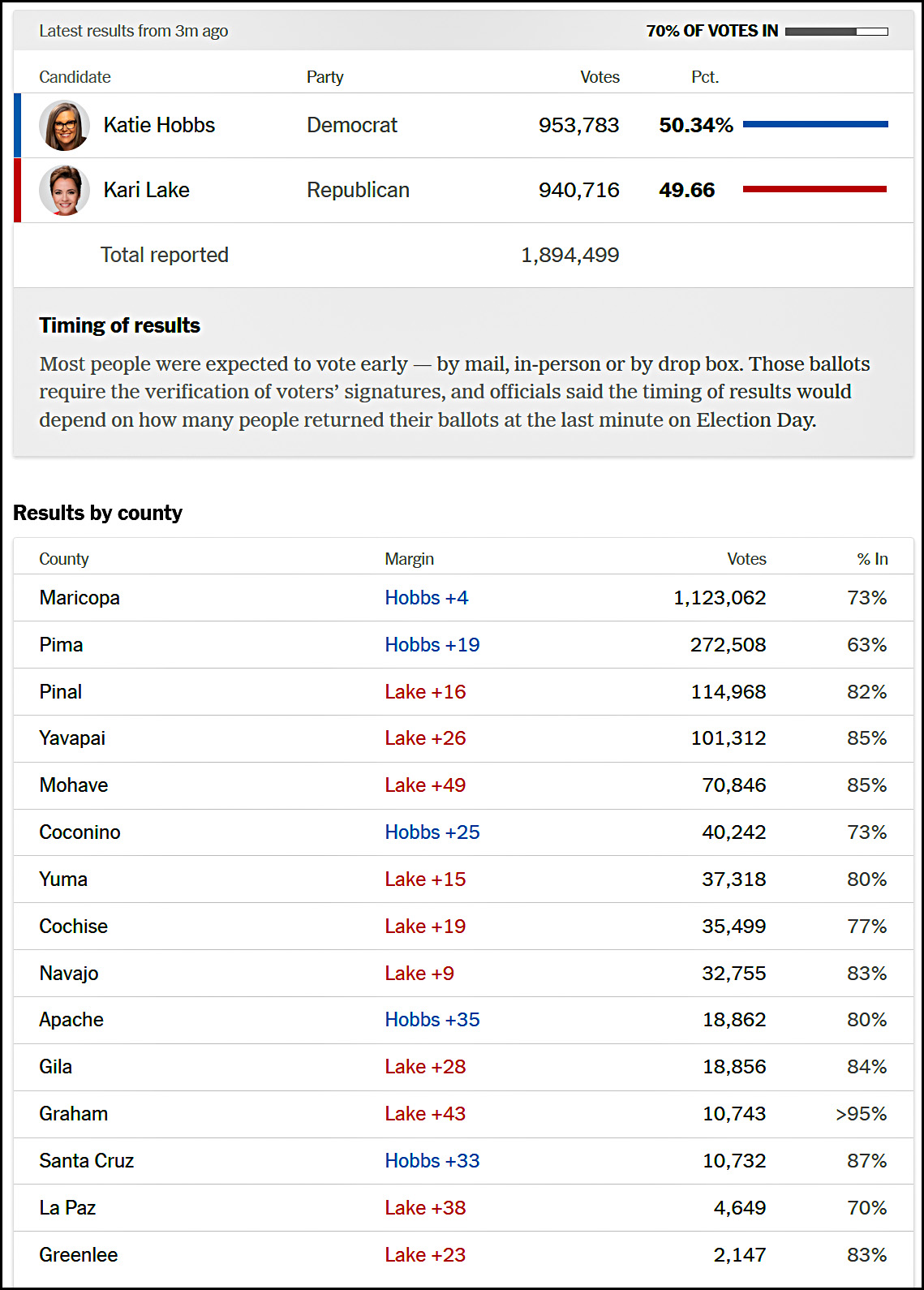 Hobbs is winning in the two biggest counties, while Lake is winning in 10 of the 13 smaller counties. And some counties have more votes already counted than others. How will that net out? I created a simple spreadsheet that assumed both candidates kept their current percentages in each county after all the votes had been counted. The result was a victory for Katie Hobbs by 51.1% to 48.9%.
Hobbs is winning in the two biggest counties, while Lake is winning in 10 of the 13 smaller counties. And some counties have more votes already counted than others. How will that net out? I created a simple spreadsheet that assumed both candidates kept their current percentages in each county after all the votes had been counted. The result was a victory for Katie Hobbs by 51.1% to 48.9%.
That's a respectable two-point difference, though it's certainly possible that late votes are systematically different from earlier votes in one direction or another. Still, at this point it looks like Hobbs will expand her current lead slightly and cut the knees off Kari Lake's oft-proclaimed "rising star" designation. Keep your fingers crossed.
Betting markets lost big on Tuesday
Everyone agrees that Donald Trump was the big loser last night. The candidates he endorsed lost. The candidates he attacked won. The secretaries of states who were big election deniers mostly lost. As early as midnight, a tsunami was building among Republicans who were demanding that the party move on from Trump, pronto.
But you know who else lost big? Betting markets. Here is Rick Maese of the Washington Post just a couple of days ago:
With control of Congress at stake in next week’s midterm elections, political observers and polling data both suggest Republicans have a strong chance of retaking the House, while the fight for the Senate is considered extremely competitive. The election betting markets, however, see less ambiguity, already essentially handing the House speaker’s gavel to Rep. Kevin McCarthy (R-Calif.) and giving Republicans about a two-thirds chance of controlling the Senate.
....Political observers study the ever-changing markets to assess candidates’ chances of winning. While traditional polling data might gauge voter sentiment from a specific period in the recent past, researchers say the betting markets offer more of a real-time snapshot as bettors react to events, endorsements and gaffes.
Hmmm. Here's a betting market on control of the Senate:
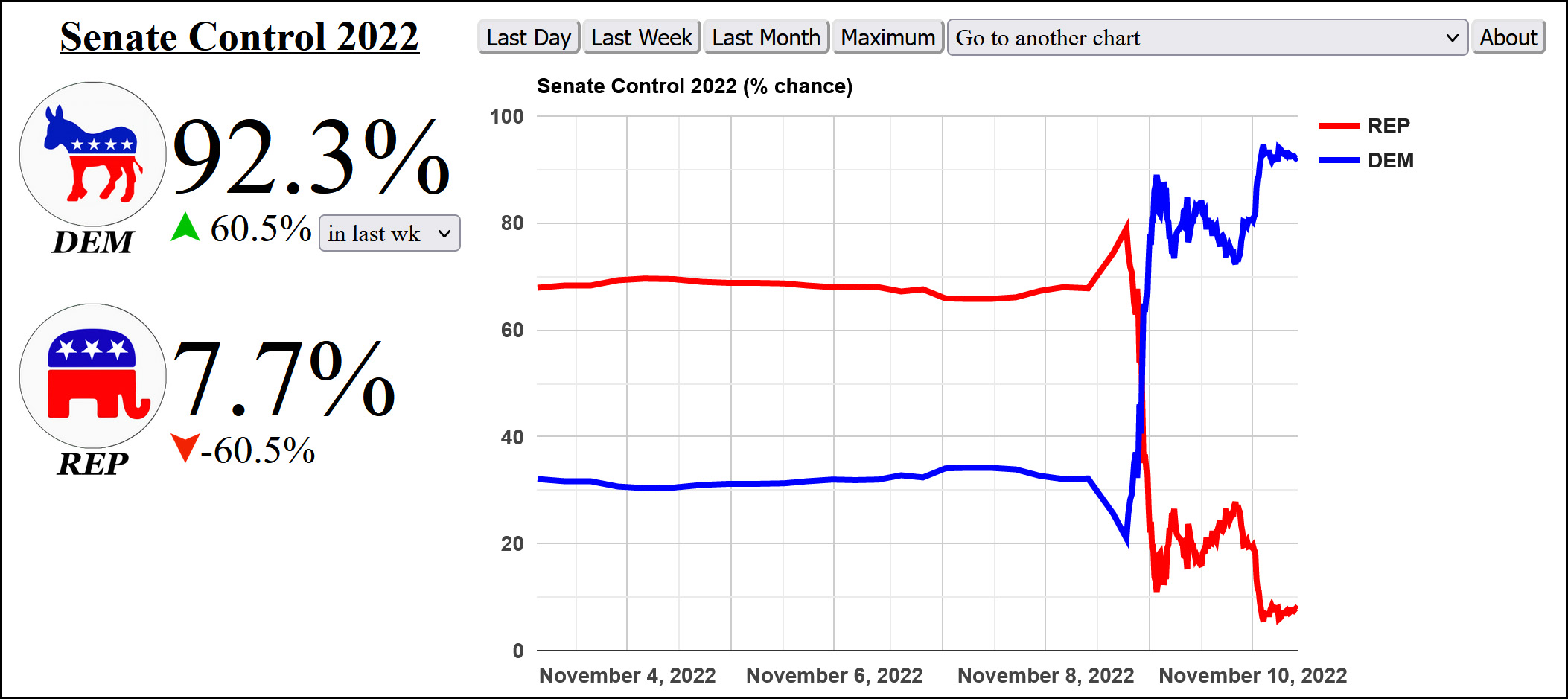 That sure changed on a dime within a day of the election! Here's the House:
That sure changed on a dime within a day of the election! Here's the House:
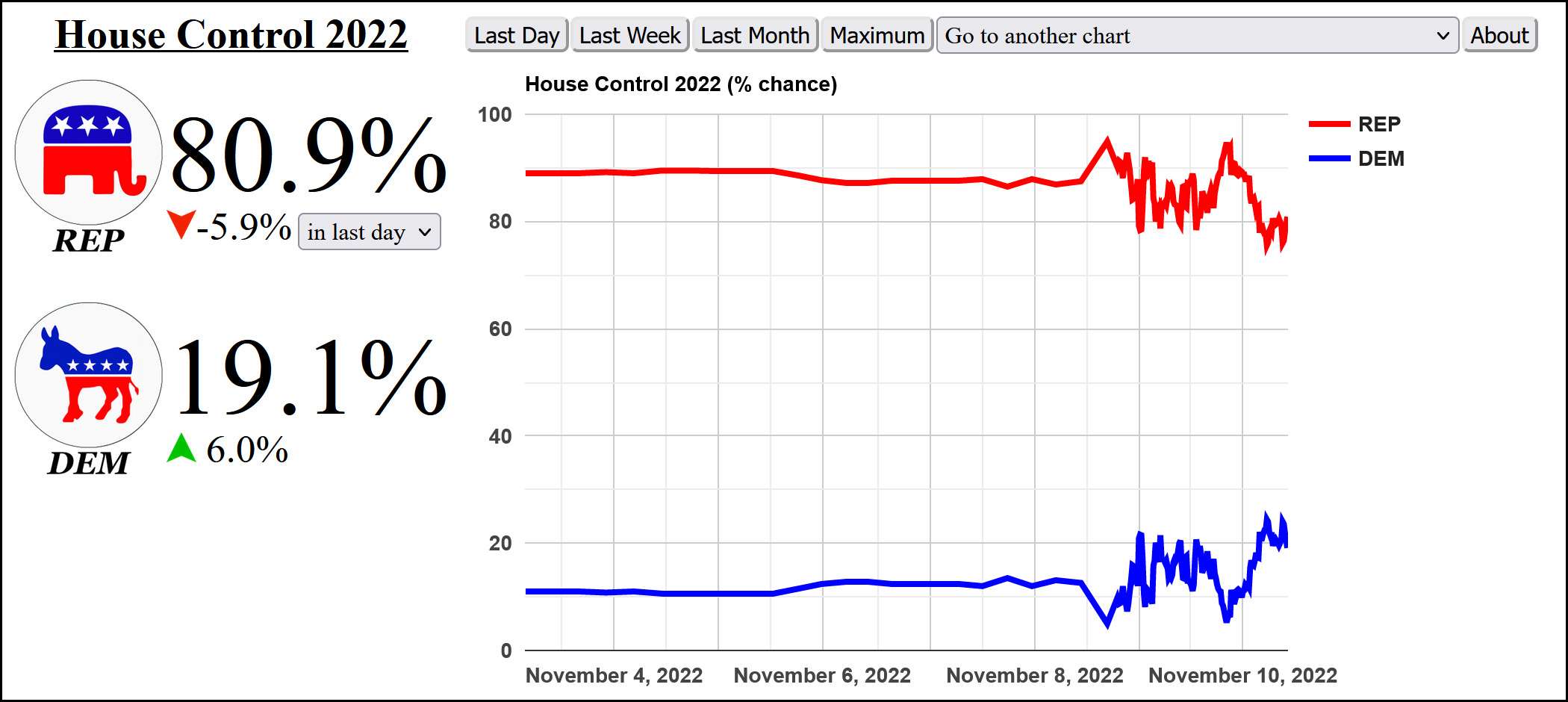 That looks a little better on first glance, but it doubled between November 8th and 9th. Not so great! Here's another one:
That looks a little better on first glance, but it doubled between November 8th and 9th. Not so great! Here's another one:
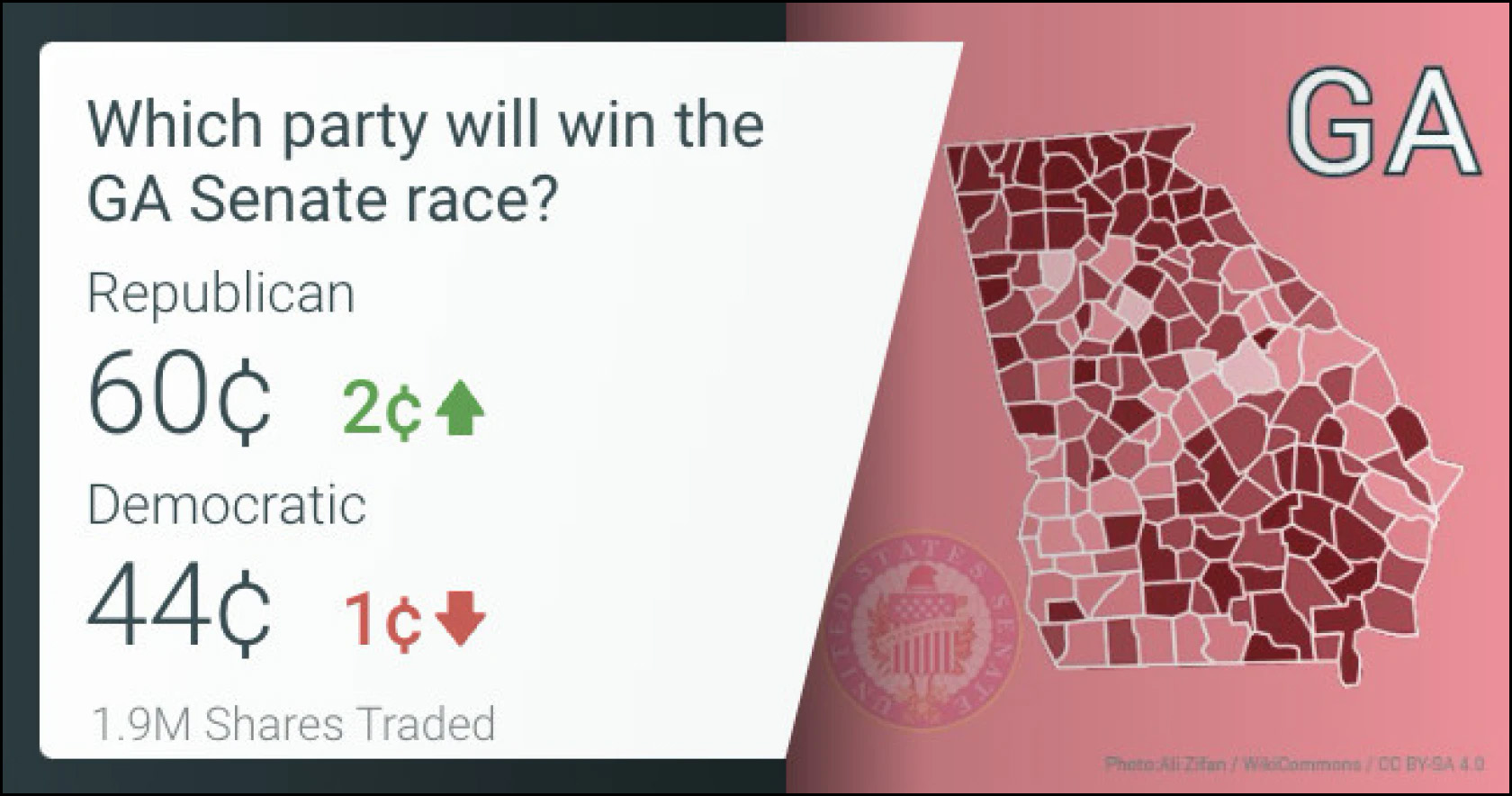 Ordinary pollsters were a whole lot closer than this.
Ordinary pollsters were a whole lot closer than this.
You can find a bunch more like these if you feel like googling for a few minutes. Nate Silver obviously has a personal interest in all this, but nonetheless here's his explanation for why betting markets aren't really that great:
One weakness of these markets is that they tend to follow the media narrative about the race more so than they do the underlying evidence. The source for this claim: yours truly, because I’ve been doing this for a very long time.
....The other weakness in these prediction markets is that the traders don’t have a lot of technical sophistication about election forecasting....There are some questions for which actually going through the process of building a model helps a lot, such as in determining how much an election forecast should shift in response to a modest but noisy shift in the polls.
I agree. Say what you will about betting markets, but the bettors themselves are mostly just talking to their friends and reading the same stuff everyone else does. Even aggregating several thousand of them doesn't average out their systemic bias toward whatever their favorite call-in show is saying.
Youth turnout this year definitely wasn’t up. But it might not have been down either.
Twitter is full of people talking about a huge uptick in youth turnout in Tuesday's midterm election. This is typical:
The story about last night's unusually high under-30 turnout is not "young people showed up to save democracy." It's "young people were treated as a constituency with valid needs, so they finally had a reason to show up."
— August C. Bourré (@FishSauce) November 9, 2022
This would be wonderful if it were true, but unfortunately it ain't true. Read all the way to the bottom for more, but here's the basic data we have so far:
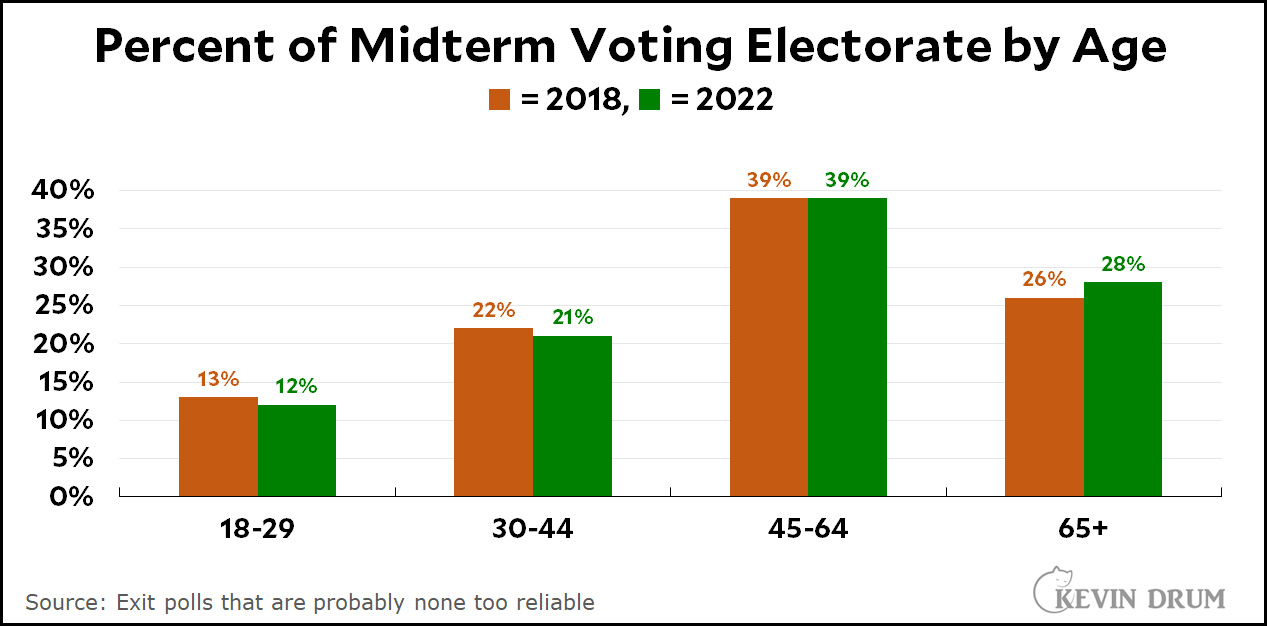 The share of young voters is lower than it was in 2018 while the share of old voters is up. For those of you who scoff at simple-minded analysis like this, here is David Shor with something so sophisticated it's almost impenetrable:
The share of young voters is lower than it was in 2018 while the share of old voters is up. For those of you who scoff at simple-minded analysis like this, here is David Shor with something so sophisticated it's almost impenetrable:
There was no "Youthquake" - turnout relative to 2018 was strongly associated with age, with turnout increasing starkly in older counties and decreasing the most in younger counties. pic.twitter.com/uElbXisUkI
— (((David Shor))) (@davidshor) November 10, 2022
Shor's scatterplots show that as the ratio of 2022 voters to 2018 voters gets larger, the percentage of young voters gets smaller while the percentage of older voters gets larger. In other words, more old voters and fewer young voters.
Even CIRCLE, which never misses a chance to hype the youth vote, admits it's way down from 2018. I have helpfully added the 2018 number to their chart:
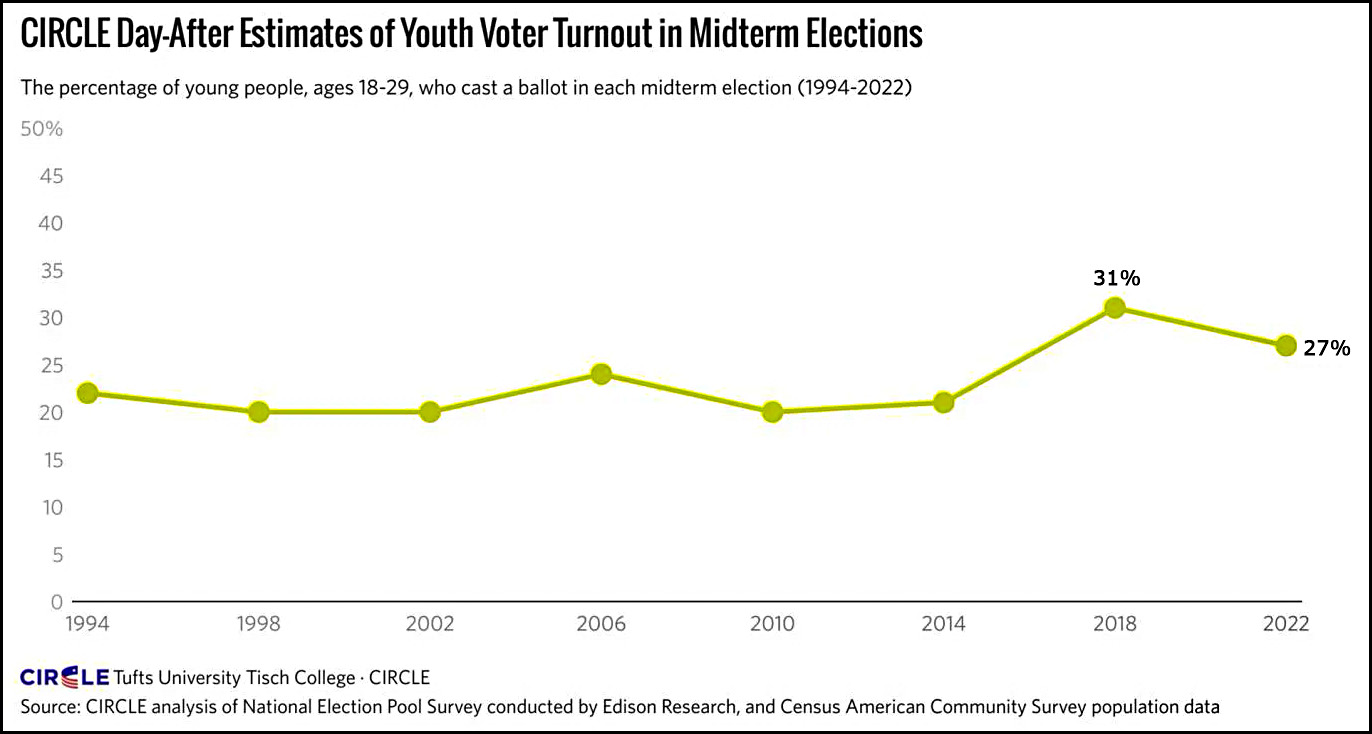 It's true that 2018 was a huge year for liberals, but that's still a pretty big decline.
It's true that 2018 was a huge year for liberals, but that's still a pretty big decline.
One other thing to note is that news reports say that Republican turnout increased more than Democratic turnout. The big difference, apparently, was in middle-aged independents, who are associated with neither youth nor progressives.
Now for the big caveat: I don't know what the source is for all these charts, but it's probably exit polls, which is just about all we have right now. Unfortunately, exit polls are notoriously unreliable, especially the initial releases. What's more, I imagine that exit polls are getting worse over time as in-person voting declines.
What I'm saying is this: the evidence suggests that the youth vote was down, and that's all we have right now. Nobody should be claiming otherwise unless they have some solid data to back themselves up.
At the same time, the picture may change over the next few months. So don't say that youth turnout is up, since there's zero evidence for that, but be careful about saying it's down since there's only unreliable data available right now. In fact, it's probably best not to say anything at all.


